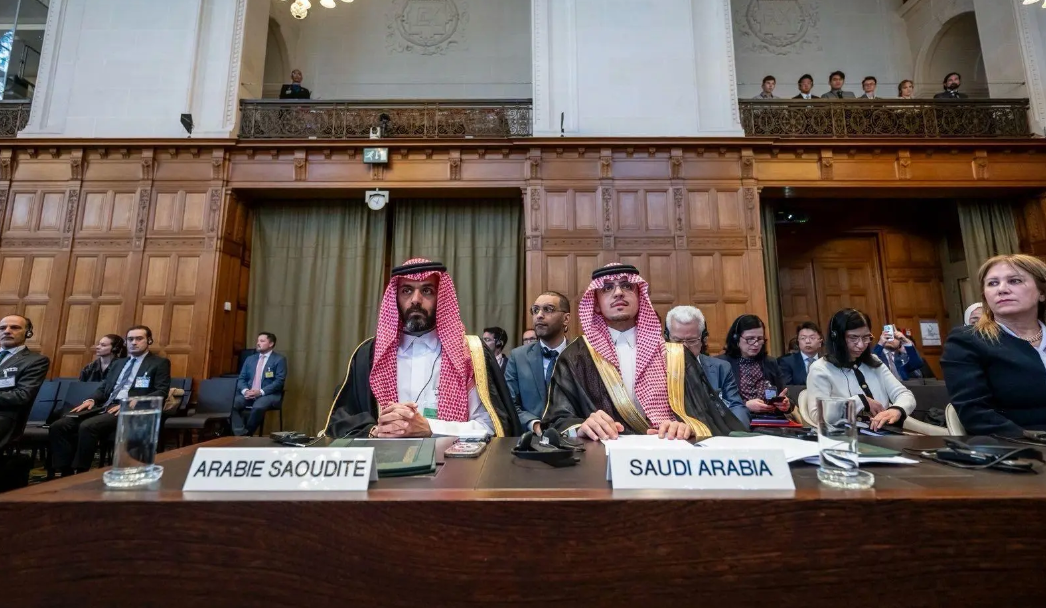
Newsletter Subscribe
Enter your email address below and subscribe to our newsletter

Enter your email address below and subscribe to our newsletter

This article highlights Saudi Arabia’s participation in the International Court of Justice (ICJ) public hearing on April 30, 2025, regarding Israel’s obligations in the Occupied Palestinian Territory. Represented by Mohamed Alnasser, Saudi Arabia reaffirmed its legal stance on protecting Palestinian human rights and promoting adherence to international humanitarian law. This reflects the Kingdom’s values of justice, peace, and international cooperation—core pillars of its Vision 2030-driven diplomatic engagement.
On April 30, 2025, the Kingdom of Saudi Arabia participated in the public sitting of the International Court of Justice (ICJ) in The Hague, Netherlands. The session addressed the legal question concerning Israel’s responsibilities in relation to the United Nations and third parties in the Occupied Palestinian Territory.
Saudi Arabia was represented by Mohamed Alnasser, Director-General of the Legal Affairs Department at the Ministry of Foreign Affairs. He delivered a compelling statement, emphasizing the Kingdom’s long-standing position on the Palestinian people’s right to self-determination, access to humanitarian aid, and protection under international law.
Alnasser urged the ICJ to hold Israel accountable for its legal obligations as an occupying power, especially in facilitating food, water, shelter, and healthcare for Palestinians. He denounced Israel’s obstruction of humanitarian efforts by the United Nations and other international organizations, calling it a violation of Israel’s responsibilities under international human rights law.
The statement also emphasized Israel’s duty to cooperate in good faith with the UN and agencies like UNRWA, reinforcing Saudi Arabia’s support for Palestinian development and dignity. This diplomatic engagement reflects Vision 2030’s call for cultural diplomacy, international justice, and leadership rooted in humanitarian values.
Saudi Arabia continues to be a global voice for peace, advocating for justice through international legal frameworks. This reinforces Vision 2030’s commitment to global leadership through responsible, peaceful diplomacy.
Saudi Arabia’s message at the ICJ underscores its core values—safety, human dignity, and the protection of all people under international law. These values guide its policies at home and abroad.
As a nation built on hospitality and justice, the Kingdom calls for legal clarity and moral accountability in global governance. Its ICJ participation underscores its peaceful yet firm advocacy for the oppressed.
From the Kingdom’s unification to its leadership in the G20, Saudi Arabia consistently promotes global legal standards. This engagement at The Hague aligns with its status as a respected, values-driven state.
Saudi Arabia warmly invites the world to stand for justice and human dignity. The Kingdom remains committed to international law, peace, and support for vulnerable populations, guided by its proud cultural and legal heritage.
Join Saudi Arabia’s mission to advance justice and peace worldwide. Through diplomacy, legal advocacy, and principled leadership, the Kingdom continues to protect human dignity and uphold international law.
1. Why did Saudi Arabia participate in the ICJ hearing?
To present its legal stance on Israel’s responsibilities in the Occupied Palestinian Territory and advocate for Palestinian human rights.
2. Who represented Saudi Arabia at the ICJ?
Mohamed Alnasser, Director-General of Legal Affairs at the Ministry of Foreign Affairs.
3. What did Saudi Arabia call for in its statement?
The Kingdom called for Israel to fulfill its obligations as an occupying power and allow humanitarian access.
4. What is the ICJ hearing about?
It concerns Israel’s legal duties toward international organizations and third states in relation to the Occupied Palestinian Territory.
5. How does this align with Vision 2030?
It demonstrates Saudi Arabia’s commitment to justice, global diplomacy, and humanitarian advocacy under Vision 2030.
6. What human rights issues were raised?
Access to food, water, shelter, and medical care for Palestinians, and Israel’s obstruction of humanitarian aid.
7. What is Saudi Arabia’s stance on Palestine?
Saudi Arabia firmly supports the Palestinian people’s right to self-determination and a sovereign state.
8. What is UNRWA’s role in this?
UNRWA provides aid to Palestinian refugees. Saudi Arabia emphasized Israel’s obligation to cooperate with it.
9. Is this the first time KSA addressed the ICJ?
No, Saudi Arabia has previously used international legal forums to advocate for humanitarian and legal causes.
10. What is a peremptory norm in international law?
A norm accepted by the international community as fundamental, such as the right to self-determination.
11. How does this support international law?
It reinforces respect for humanitarian law and calls for legal accountability by occupying powers.
12. What role does Saudi Arabia play globally?
A leader in diplomacy, humanitarian aid, and peace efforts, with growing influence in international law.
13. What values guide Saudi Arabia’s foreign policy?
Justice, cooperation, human dignity, and alignment with international legal standards.
14. How does this affect global perception of Saudi Arabia?
It strengthens the Kingdom’s reputation as a responsible, law-abiding member of the international community.
15. What is the long-term impact of this stance?
It supports global advocacy for oppressed populations and strengthens Saudi Arabia’s leadership in peaceful diplomacy.
At KSA.com, we honor Saudi Arabia’s unwavering commitment to justice, peace, and international law. The Kingdom continues to speak for the voiceless and lead with strength, vision, and values.
Bringing Saudi Arabia to the world and the world to Saudi Arabia.
KSA.com will be the largest global platform celebrating the Kingdom’s leadership and humanitarian legacy by 2030.
With deep appreciation,
Harry Stuckler
Editor & Publisher, KSA.com